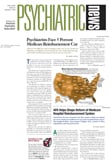The latest twist in the “Do SSRIs increase a child’s risk of suicide?” debate occurred October 27, when the U.S. Food and Drug Administration (FDA) announced it would convene a special advisory committee, composed of members of the Psychopharmacologic Drugs Advisory Committee and the Pediatric Subcommittee of the Anti-Infective Drugs Advisory Committee next February to examine the issue.
The agency also issued a public health advisory as an e-mail to all licensed U.S. physicians through the agency’s MedWatch electronic notification system.
The FDA noted that while depression in children and adolescents itself increases a patient’s risk of suicidality, the agency determined through a review of clinical trials data for eight different medications that “preliminary data suggest an excess of reports [of suicidality] for patients assigned to several of these antidepressant drugs compared with those assigned to placebo.”
The agency began reviewing all available clinical trials data for antidepressants in pediatric populations after British regulators raised serious concerns in May regarding an apparent increase in suicidality in patients taking paroxetine (Paxil).
The FDA also reviewed data for citalopram (Celexa), fluoxetine (Prozac), fluvoxamine (Luvox), mirtazapine (Remeron), nefazodone (Serzone), sertraline (Zoloft), and venlafaxine (Effexor). Although data on fluvoxamine were reviewed, it is not approved in the United States for the treatment of depression; however, it is a commonly used antidepressant in other countries.
In June, after British regulators warned physicians in the United Kingdom not to prescribe paroxetine to patients under age 18, the FDA initially took the same strong stance (Psychiatric News, July 18). The current advisory, however, is less stringent. It notes that the FDA recognizes that pediatric major depressive disorder (MDD) “is a serious condition for which there are few established treatment options, and that clinicians often must make choices among treatments available for adult MDD. The FDA emphasizes that these drugs must be used with caution.”
Thomas Laughren, M.D., the FDA’s neuropsychiatric drug products team leader, noted, “We’re not saying these drugs can’t be used. We are saying one should proceed with caution. Once we analyze the data more fully, we’ll be in a better position to make a more formal recommendation.”
The agency has requested more data from the makers of each of the medications in question and intends to re-examine many of the suicidal outcomes noted in the 4,100 children and adolescents exposed to SSRIs in clinical trials.
For example, the FDA has asked the companies to provide complete histories of each of the patients who participated in clinical trials to look for any increased risk of suicidality in the patients, regardless of drug assignment.
The combined advisory panel hearing will be held February 2, 2004, at a location to be announced soon. Panel hearings are usually held in or near the Washington, D.C., suburb of Rockville, Md., where the agency is based. At least a significant portion, if not all, of the hearing will be open to the public.
The agency plans to ask the panel to decide whether SSRI antidepressants should be prescribed to children and adolescents, whether the label warnings are sufficient or need revision, and what studies should be done to determine whether there is a direct link between the medications and suicide.
The FDA Public Health Advisory is posted on the agency’s Web site at www.fda.gov/cder/drug/advisory/mdd.html. An FDA Talk Paper on the issue is posted at www.fda.gov/bbs/topics/ANSWERS/2003/ASN01256.html. ▪
